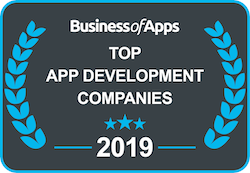The app development marketplace has grown hugely over the last few years, with an abundance of developers offering a variety of technical skills and capabilities, making it easy to find developers located across the world. However, finding the right developer who can understand and align with your business needs can prove slightly more difficult. The rates and approaches provided by development agencies and individual developers can vary massively making it difficult to choose the team that aligns best with your project. We’ve collated a few tips based on our experience as an app development agency which we hope will help in your decision-making process.

Define the level of support you require
Initially, it’s useful to honestly assess what stage your project is at, as this will dictate the level of involvement you require from your chosen app developer. No app developer can provide an accurate cost estimate until your project is clearly defined. If you’re at the ‘ideas’ or ‘brainstorming’ stage you’ll most likely require the advice or consultancy offered by an agency rather than an individual developer. Development agencies generally have long-standing industry experience with a wide range of accessible resources and expertise to help guide your concept throughout the product life cycle. If you have completed the design process internally and have a technical specification or an existing project management team you may be able to hire an individual developer which would certainly be cost-effective. However, hiring a single developer for a large project can leave your product vulnerable if the developer is unreliable or moves on leaving the build unfinished. Comparatively, a development agency will have the capacity to devote multiple developers to building your product, ensuring the overall success of the project.

Adding value to your business
Finding the right digital partner is far more important than saving on cost. You must find the right development partner who will work collaboratively with your internal team, offering consultancy which stems from years of experience, providing the most cost-effective development and return on investment. Similarly, it’s important to look for a developer who is interested in your business and your product and can provide creative input based on previous work within your industry or similar products.
When kickstarting an app project it is tempting to add lots of complex features that you think your users will love. However, it’s important to look at each feature critically to define how much value it will bring to your business and weigh this up against the cost to develop each feature. A good app developer will work with you to prioritise your features and come up with a minimal viable product (MVP) that fulfils your business objectives. This process will ensure that your product is developed quickly and within your budget, as you can roll-out additional features at a later phase once you’ve received user feedback.
Clarifying technical requirements
Your chosen agency should be able to recommend the best technical solutions for your project after receiving your brief of requirements and technical specification. If you lack a technical background your app developer should be able to provide you with an understanding of the technical processes and offer recommendations based on your target audience/demographic and user needs. Also, they should be able to advise on the best hosting environment for your data and backend, this should be scaleable to evolve as your business grows as well as designed with a high-level of security and resilience. Most mobile apps store a basic level of personal or business data which could be detrimental to your business and customer base should it be compromised or hacked into, so choosing an agency you can trust with your data and comply with GDPR is extremely important.

Building a partnership
Your chosen developer must stay with you throughout the lifecycle of the product. Your developers should keep you informed and up-to-date with project progress and regularly ask for your feedback based on your business goals and objectives.
If you’re not a technical company or lack in-house technical capabilities, choosing an agency able to offer maintenance and hosting packages with an agreed service level agreement is worth taking into consideration; building a partnership that grows with your product.
When it comes to choosing a developer that you wish to build a long-standing rapport with, lookout for company values that resonate with your business values or personal values to gauge whether they’d be a good fit for your company and align with your way of working.

Process is key
Development is far more than a single exercise and requires an experienced team; when you’re paying for app development you’re investing in a package, it goes far beyond the coding. You’ll need a UX and UI designer to develop a brand and aesthetic for the app and map out the user journey that best suits your audience. The user journey is arguably the most important aspect of your app as it dictates how users will interact with your product and ultimately, your brand. A well-established development partner will have a design team to carry out UX and UI, and branding if required, as well as developers specialising in your desired development platform or requirement, a project manager to oversee the project progress and keep your internal team up-to-date, as well as quality assurance to conduct user testing before product launch. Capabilities extend beyond this, as a great development partner will host your product as well as take care of maintenance beyond the product build. It’s important to gain an in-depth understanding of a developer’s process or mode of working before selecting them to carry out the project to ensure they’re providing the level of service you require.
If you require mobile app design services as well as development, then it’s important to understand the level of complexity that goes into the design process before you commission a development team to ensure that you’ve selected a team who offer UX and UI design, which will form the foundation of your app. Below is a thorough breakdown of what you should expect to receive from an agency with great design capabilities.
Discovery& Research
- A great developer/development agency should carry out extensive competitor research focusing on existing products within your market and gather information about your target audience/customers to gain a full understanding of their needs and the problem you aim to solve.
Product Refinement
- If you haven’t yet solidified your concept, then finding an agency who can help with this will prove to be extremely valuable. Agencies/developers who offer such a service will work with you to refine your idea into a fully defined and detailed concept to drive the creation of the sitemap and wireframes. This will involve developing all of the products individual features to understand how each of them will work, clarifying and scoping out key user journeys, and prioritising all functional requirements for the MVP.
Site-map
- If you do not have an internal design team then commissioning an agency with designers who can carry out UX is essential. The design team should work with you to build a site-map of your product’s content which should give you a clear overview of the whole product.
Wireframes
- As well as the site-map, black and white wireframes will map out the key user journeys and structure of each screen, ensuring your product has all essential features previously identified. This is an experimental stage that explores the most efficient way of solving the problem for your target audience; focusing solely on user flow and core functionality without focusing on any branding or visual design, to ensure your product is as intuitive and easy to use as possible.
Interactive Prototype
- Having digitised the wireframes, your chosen agency should provide you with an interactive prototype using a prototyping tool such as InVision or Sketch to demonstrate the relationship between the screens and the core functionality of the product. This gives you a chance to experience using the product at an early stage, and allow you to provide regular feedback.
Internal usability testing (concept validation & iterations)
- The development team should carry out testing to proof the concept, going back through the product to evaluate its usability and implement any changes received from client feedback — cementing core functionality, user flows and general structure; ready for the visual design to begin.
Visual Design
- Visual design is the application of brand guidelines to the wireframes to develop the look and feel of your product. This includes a variety of assets ranging from colours and fonts to icons, logos and transitions; the use of which will depend on the individual needs of your project.
Technical specification & scope of work
- Whilst design is being explored and implemented, your chosen agency should create a technical specification document that details all features, functionality and third-party integrations.
Assess their portfolio
When reviewing developers ensure that you look through their online portfolio to assess their capabilities and the types of products they have produced. If their website doesn’t have a portfolio or selection of case studies for you to view then send them an email requesting a copy of their marketing material such as a creds deck or a brochure so you can find out more about the projects they have worked on and their client list. Whilst it’s not essential that they have built the same product before it is important to choose a partner that has worked on projects of a similar scale with features comparable to yours.
Aesthetics are key to the success of an app so look out for well-designed apps with attractive user interface (UI). An app may look great but will still fail if it’s difficult to use so make sure you find a partner who has the skills and experience to create a great user experience (UX).

Reviews and references
Check reputable review/comparison sites and listings to see how the developer/agency performs and how their previous or existing clients describe working with them. For further insight, feel free to ask an app developer/agency for references and speak to their clients for first-hand testimonials.

Price should not dictate your overall decision
Budget is of course carefully taken into consideration when choosing an app developer, and often budget constraints dictate who you’ll choose to proceed with. However, it’s worth remembering that choosing an individual developer as opposed to a development agency can often cost more in the long-term as it may require re-doing the app with an agency if it doesn’t turn out as you had initially hoped, or if there are multiple issues with the build. If you have a fixed budget we would recommend refining your feature list rather than compromising on the quality of development. Here at Red C, we produce a MoSCoW document in which we help you prioritise features into ‘must-haves’, ‘should-haves’, ‘could haves’ and ‘won’t haves’ to help you define your core features and functionality whilst rolling out less important features during a later phase of development, keeping within your budget.
Payment models
It’s difficult to compare prices you receive from different developers/development agencies as pricing models and hourly rates vary dramatically between UK developers and agencies and even more so when you compare UK developers to international developers. Therefore, it is fundamental that you commission a developer who offers a pricing model that suits your budget and timescales. As well as pricing, choosing a developer that offers the right development approach or methodology for your project is extremely important especially if you have a tight deadline to meet or a launch date in mind for your product.
Fixed price — If you’re working towards a fixed price for your project with a tight budget then we recommend a waterfall approach to development which entails a breakdown of project activities into linear sequential phases from the outset, ensuring that you have a clear project plan and deadline fitting within your fixed budget and timeframe. This approach works well for smaller projects and businesses with a restricted budget.
Time and materials — If you’re looking for a greater level of flexibility and are not constrained by a fixed budget then an agile development approach priced on time and materials would suit your business needs. Agile methodology involves splitting the projects into sprints which involves daily stand-ups with your project manager and retrospectives after the completion of a sprint to evaluate what went well and what needs to be achieved in the following sprint. This provides a greater level of flexibility as you’re able to move tasks into a later sprint if need be and scale the project based on your internal deadlines; whilst payment is based on the number of development hours you’ve accumulated across each sprint. This approach works best for larger projects with complex features, especially for companies who wish to have daily updates and regular feedback as an agile methodology allows for a far more collaborative development approach.

Questions to ask your developer
- Should I build natively or cross-platform?
- Should I develop on iOS or Android first?
- How complicated is my app to build?
- Which development methodology/approach would you recommend for my project?
- Which hosting environment is best for my product?
- What security measures should be put in place to secure my data?
Email for enquiries: georgia@red-c.co.uk



